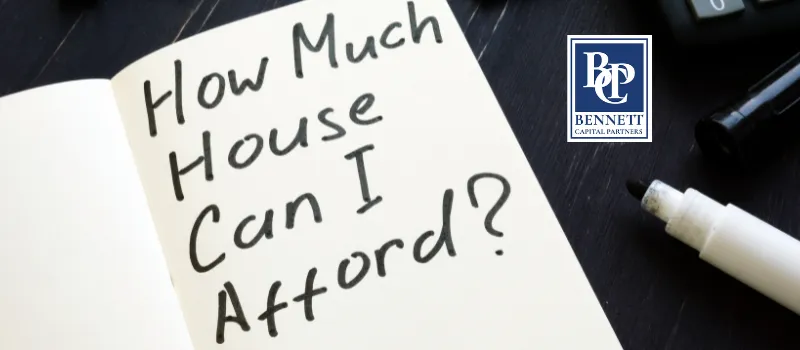How Much House Can I Afford? Use Our Mortgage Affordability Calculator
Updated: Sep 17, 2023

Understanding how much house you can afford is a critical step in the home buying journey, but let's be honest, it can often feel like trying to find your way through a dense fog. We totally get how overwhelming this process can be.
That’s why we’ve taken the time to create an easy-to-use mortgage affordability calculator. It provides straightforward answers to help take some of the mystery out of purchasing a home.
Are you ready to unlock your home-buying potential? Let's uncover it together!
Key Takeaways
✅ Your annual income, total monthly debts, down payment amount, and debt-to-income ratio are factors that impact how much house you can afford.
✅ Making a substantial down payment can lower your loan amount and monthly mortgage payments, while loans with no down payment options are available for eligible borrowers.
✅ Interest rates and the length of the loan term also affect affordability. Lower interest rates can increase affordability by reducing monthly payments, while shorter loan terms mean higher payments but less interest paid over time.
Quick Navigation - Click the link below to jump to that section..
Factors that Impact How Much House You Can Afford

Several factors play a significant role in determining how much house you can afford. These include your annual income, total monthly debts, the size of your down payment, debt-to-income ratio (DTI), interest rate, and loan term.
Additionally, expenses such as property tax, homeowner's insurance (HOI), private mortgage insurance (PMI), and homeowner's association (HOA) dues can also impact affordability. It is essential to consider all these factors when calculating how much house you can afford.
📌Annual income
Your annual income plays a pivotal role in home affordability. It directly influences how much mortgage lenders are willing to loan you and consequently, the price range of houses that are financially feasible for you.
Keeping track of your gross monthly income is crucial, as it helps determine your ability to meet monthly mortgage payments comfortably. Typically, lenders prefer that your mortgage payment doesn't exceed 28% of your gross monthly income which is a standard rule in the industry.
However, this can differ based on various factors including your credit history and current market conditions.
📌Total monthly debts
Understanding your total monthly debts is a crucial step in figuring out how much house you can afford. This includes everything from student loans to credit card bills, car payments and any other recurring financial obligation you have every month.
These expenditures are important considerations for lenders as they assess whether or not you're financially fit to handle a mortgage.
Keeping track of these expenses allows us to see the bigger picture regarding our affordability. It just makes sense: The less debt we carry each month, the more income we will have available for a monthly mortgage payment.
Managing our debts effectively and sticking with a strict budget can help secure home loan approval and eventually lead us into owning our dream home without overwhelming our finances.
📌Down payment
Making a substantial down payment can significantly influence your home affordability. It not only reduces the loan amount but also lowers monthly mortgage payments. Saving for this initial cost may seem like an uphill task, yet it plays a crucial role in making homeownership more achievable.
In fact, various house loans even offer options for no down payment, broadening your choices when deciding on home buying plans. Ultimately, the size of your down payment directly affects how much house you can afford with our mortgage affordability calculator.
📌Understanding the Minimum Down Payment for a House
When buying a house, it's crucial to understand the minimum down payment required. The down payment is the initial amount of money you need to pay upfront towards the purchase price of the property.
It typically ranges from 3% to 20% of the home's value. A higher down payment can lower your monthly mortgage payments and may also help you secure better interest rates and loan terms.
Knowing how much you need for a down payment will give you a clearer picture of what homes are within your budget and help you plan accordingly based on your financial situation.
For some potential buyers, coming up with a large down payment can be challenging. However, there are options available that don't require a significant upfront payment. Some government-backed loan programs, such as VA loans or USDA loans, offer financing options with no down payment requirements for eligible borrowers.
📌Exploring House Loans with No Down Payment
House loans with no down payment can be an attractive option for homebuyers who don't have a large sum of money set aside for a down payment. These types of loans eliminate the need to make an upfront payment, allowing borrowers to purchase a home without tapping into their savings.
However, it's important to understand that there may be certain eligibility requirements and restrictions associated with these loans. By exploring house loans with no down payment, you can determine if this option is right for you and find out how it may impact your overall affordability.
📌Debt-to-income ratio (DTI)
Your debt-to-income ratio (DTI) is an important factor when determining how much house you can afford. It is calculated by dividing your total monthly debt payments by your gross monthly income.
Lenders use the DTI to assess your ability to manage mortgage payments alongside other financial obligations.
A lower DTI is preferred as it indicates a lower risk for lenders and a higher likelihood of being able to afford the mortgage payments. Lenders typically have a maximum DTI ratio they are willing to accept, often around 43%.
This means that your total monthly debts should not exceed 43% of your gross monthly income.
📌Interest rate
Interest rates play a crucial role in determining how much house you can afford. Lower interest rates can increase your affordability by reducing your monthly mortgage payments. This means that with a lower interest rate, you may be able to qualify for a larger loan amount and purchase a more expensive home.
On the other hand, higher interest rates will result in higher monthly payments and potentially reduce the amount of house you can afford. It's important to keep an eye on interest rates and consider options like refinancing to lower them if possible, as this can save you money over the life of your loan.
Ultimately, aiming for a lower interest rate will enhance your affordability and help you save on long-term costs.
📌Loan term
The loan term is an important factor that impacts affordability when determining how much house you can afford. It refers to the length of time in which you must make mortgage payments.
The longer the loan term, the lower your monthly payments will be, but you'll end up paying more in interest over the life of the loan. Conversely, a shorter loan term means higher monthly payments, but less money paid towards interest.
Using an amortization schedule can help you budget and plan for future expenses based on the loan term. Additionally, making extra payments towards the principal can reduce the loan term and help you pay off your mortgage faster.
📌Property tax
Property tax is an essential factor to consider when determining the affordability of homeownership. It significantly impacts the overall cost, as property tax rates can vary based on the location and assessed value of the property.
High property tax rates can make it less affordable for individuals to become homeowners. Additionally, these rates can fluctuate over time, potentially affecting long-term affordability.
To ensure ongoing affordability, it's important to research and consider property tax rates before purchasing a home.
📌Homeowner's insurance (HOI)
Homeowner's insurance (HOI) is an important factor to consider when determining how much house you can afford. This type of insurance covers damage or loss to your home and its contents, providing financial protection in case of unexpected events like fire or theft.
When calculating affordability, the mortgage calculator takes into account the cost of homeowner's insurance along with other factors such as monthly income, debts, and down payment.
It's worth noting that making extra payments towards your principal can help reduce the cost of homeowner's insurance over time. Additionally, exploring refinancing options may provide opportunities to lower the overall cost of homeowner's insurance.
📌Private mortgage insurance (PMI)
Private mortgage insurance (PMI) is a requirement for borrowers who have made a down payment of less than 20% of the home's purchase price. It is usually added to your monthly mortgage payments.
Understanding how much of your monthly payment goes toward PMI is important for tracking your progress in paying off the loan. At Bennett Capital Partners, we offer a free mortgage amortization loan calculator schedule tool that can help you navigate the complexities of home financing and understand the breakdown of your loan payments, including the portion going towards PMI.ffirrst
With this tool, you can easily see how amortization ensures that at the end of the loan term, there will be no remaining balance. So if you're wondering how much house you can afford and want to stay informed about your loan details, our helpful tools are here to assist you every step of the way.
📌Homeowner's Association (HOA) dues
Homeowner's Association (HOA) dues can have an impact on the affordability of a house. When determining how much you can afford, it is important to consider these additional expenses.
HOA dues are typically paid monthly or annually and cover shared community amenities and maintenance costs. These fees vary depending on the neighborhood and the services provided by the association.
It's essential to factor in HOA dues when calculating your monthly mortgage payment and overall housing budget to ensure you can comfortably afford your new home without any surprises down the road.
How to Use A Mortgage Affordability Calculator

To calculate affordability, utilize our mortgage affordability calculator and consider factors such as your monthly mortgage payment, income, down payment, credit score, and debt-to-income ratio.
Bennett Capital Partners Amortization Calculator
Unlock the power of financial planning with the Bennett Capital Partners Amortization Calculator. This user-friendly tool is designed to help you calculate your monthly mortgage payments with ease. Our Mortgage Amortization Loan Calculator Schedule Tool offers a comprehensive Total Cost Breakdown Chart and an insightful Amortization Table. Navigate the complexities of home financing by understanding how each payment is allocated towards principal and interest.
👇 Click Below to Calculate Your Monthly Payments 👇
🎯 Use Our Mortgage Payment Affordability Calculator
Our mortgage affordability calculator is the perfect tool for anyone looking to determine how much house they can afford. By taking into account factors such as your net income, monthly debts, down payment amount, home equity, and location, our calculator provides an accurate estimate of your affordability.
It follows the 28/36 debt-to-income rule, which helps you understand how much of your income should be allocated towards housing expenses. Additionally, our calculator offers a helpful chart that shows how different down payment percentages can impact your monthly mortgage payment for a $300,000 home.
So don't hesitate to use our mortgage affordability calculator today and take the first step towards securing your dream home.
🎯 Follow the 28/36% rule
We recommend following the 28/36% rule when determining how much house you can afford. This rule suggests that you should not spend more than 28% of your monthly income on housing-related expenses and no more than 36% on all debts.
By adhering to this guideline, you can ensure that you are not overextending yourself financially and can comfortably manage your mortgage and other financial obligations. The affordability calculator we provide follows this rule to calculate the maximum monthly mortgage payment you can afford based on your income and debts.
Following the 28/36% rule is a sensible approach to homeownership, as it helps prevent potential financial strain in the long run.
🎯 Consider your monthly mortgage payment
We understand that one of the most crucial factors in determining how much house you can afford is your monthly mortgage payment. This payment includes both principal and interest, as well as other components such as property taxes and homeowner's insurance.
By considering your monthly mortgage payment, you can get an accurate picture of what you will be paying each month towards owning a home. Our mortgage affordability calculator can help you calculate this amount based on your income, expenses, and other financial factors, allowing you to make an informed decision about the price range of houses within your budget.
🎯 Determine how much house you can afford based on your income
Our mortgage affordability calculator can help you determine how much house you can afford based on your income. Simply input your annual income and monthly debts, along with any other factors such as down payment amount and interest rate, to get an estimate of the price range that fits within your budget.
This tool takes into account important financial considerations like the 28/36 debt-to-income rule, which suggests not spending more than 28% of your monthly income on housing expenses.
By using our calculator, you can make informed decisions about homeownership and find a home that aligns with your financial goals.
🎯 Factor in your down payment
When determining how much house you can afford, it's crucial to factor in your down payment. Your down payment is the amount of money you pay upfront towards the purchase price of the house.
It plays a significant role in determining the total loan amount and monthly mortgage payments. Generally, a larger down payment leads to a smaller loan amount and lower monthly payments.
Additionally, having a substantial down payment can also help you qualify for better interest rates and potentially save on mortgage insurance costs. So, before starting your home search or using a mortgage affordability calculator, consider how much you can comfortably put towards your down payment as it will have an impact on your overall affordability.
🎯 Consider other factors such as credit score and debt-to-income ratio
Your credit score and debt-to-income ratio are important factors to consider when determining how much house you can afford. Lenders will take these into account when deciding your interest rate and whether or not to approve your mortgage application.
A higher credit score can help you qualify for a lower interest rate, which can ultimately save you money over the life of your loan. Your debt-to-income ratio compares your monthly debts to your gross monthly income, and a lower ratio indicates that you have more disposable income available for housing expenses.
These factors are crucial in assessing your overall financial health and determining what price range of homes you should be considering.
Most Affordable Markets for Homebuyers To Buy A Home

Discovering the most affordable housing markets is essential for homebuyers. Explore cost of living, job opportunities, and amenities in different areas to make an informed decision about where to buy a home.
Find out more about these markets and start your journey to homeownership now!
Research affordable housing markets
To find a home that fits your budget, it's important to research affordable housing markets. Consider factors such as cost of living, job opportunities, and amenities in different areas. Look for housing markets where home prices align with your budget and where you can comfortably afford your monthly mortgage payments. Take the time to explore options specifically designed for first-time homebuyers, as they may provide additional benefits or assistance. Remember that conducting thorough research can help you make an informed decision and find the most affordable market for your needs.
Consider cost of living, job opportunities, and amenities in different areas
When determining how much house you can afford, it's important to consider more than just your financial situation. Factors such as cost of living, job opportunities, and amenities in different areas play a significant role in housing affordability.
Researching affordable housing markets is crucial to finding the right location for your budget. By evaluating these factors, you can make an informed decision about where to buy a home that aligns with both your financial goals and lifestyle needs.
Explore options for first-time homebuyers
As first-time homebuyers, there are various options available to help you navigate the process of purchasing a house. Here are some options to consider:
✅ Research affordable housing markets: Take the time to explore different housing markets and identify areas that offer affordable homes. Consider factors such as cost of living, job opportunities, and amenities in these areas.
✅ Look into programs for first-time homebuyers: Many government and private organizations offer programs specifically designed to assist first-time homebuyers. These programs often provide financial assistance, lower interest rates, or down payment assistance.
✅ Consider FHA loans: Federal Housing Administration (FHA) loans are popular among first-time buyers due to their low down payment requirements and more lenient credit score qualifications.
✅ Look into VA loans: If you are a veteran or an active-duty service member, you may be eligible for a VA loan, which can offer favorable terms with no down payment required.
✅ Explore conventional loans: Conventional mortgages may also be an option for first-time homebuyers. While these loans typically require a higher credit score and a larger down payment, they often have more flexible terms.
Conclusion - Home Affordability Calculator

In conclusion, determining how much house you can afford is a crucial step in the homebuying process. Our Mortgage Affordability Calculator and Rent VS Buying Calculator can help you estimate your monthly payment and evaluate your financial situation.
By considering factors such as income, debts, down payment, and interest rate, you can make an informed decision about buying a home that fits within your budget. Take advantage of our calculator to find out how much house you can afford today!
Key Terms and Important Concepts
When it comes to buying a home, one of the most pressing questions on everyone's mind is, "How much home can I afford?" It's a crucial query, especially with fluctuating mortgage interest rates and varying home values in the market. The answer isn't always straightforward, as several factors come into play.
Firstly, most homes require a down payment, which can significantly impact the amount you can spend on a house. This initial payment is a percentage of the home's purchase price, and it can vary depending on the type of home loan you choose. For instance, some loans, like the FHA loan, might allow for a smaller down payment, letting you afford with an FHA loan a slightly pricier home.
Another essential factor to consider is whether you can qualify for a mortgage. Your credit score, debt-to-income ratio, and other financial aspects will determine the mortgage you can afford. Additionally, don't forget to factor in other costs like home insurance, which can add to your monthly expenses.
Our affordability calculator to estimate the home price you can manage is a valuable tool in this process. By inputting details like your income, monthly debts, and desired loan term, the calculator also provides an estimate of the mortgage payment each month. This helps you gauge how much you earn in relation to what you can afford to pay for a home.
The affordability based calculations give you a clearer picture of your ability to afford a particular house. It's not just about the sticker price but understanding how much home you can afford in the long run. If the numbers don't align with your budget, there are ways to improve your home affordability, such as opting for a longer loan term or seeking out homes in a different price range.
Remember, it's not just about how much mortgage you can afford, but also ensuring you can manage the house with a monthly payment comfortably. You don't want to stretch yourself too thin and struggle to afford to pay every month.
Our affordability calculator estimates how much house you can realistically purchase, giving you a clearer understanding of your financial boundaries. The home affordability calculator can help you make informed decisions, ensuring you find a home that fits both your dreams and your budget. So, before you dive into house hunting, assess how much house you can manage and use our tools to determine the ideal home price you can afford.
FAQs
What is the purpose of a home affordability calculator?
A home affordability calculator helps you determine how much house you can afford based on factors like mortgage rate, income, and monthly expenses.
How do I use the home affordability calculator to get an estimate?
To calculate how much house you can afford with our home affordability calculator, input your earnings, type of mortgage you choose, car loan information and other financial details.
Does the type of mortgage influence my ability to buy a house?
Yes! The type of mortgage or home loan significantly impacts your monthly payment each month and overall home purchase price that you can reasonably afford.
Do closing costs affect how much house I can afford?
Closing costs are part of your total expenses in buying a house which should be factored into calculations with our affordability-based tool to ensure accurate results.
What role does a down payment play in figuring out how much I can pay for a house?
Making a significant down payment reduces your mortgage loan amount leading to lower monthly payments; thus influencing what kind of property fits within your budget according to our calculator's analysis.
Can using this tool lead me towards better financial decisions when intending to make a purchase?
Absolutely! Utilizing this tool will help determine how much money is feasible for spending on housing without causing too much debt while also suggesting ways on improving your home purchasing power.

Philip Bennett
Philip is the owner and Licensed Mortgage Broker at Bennett Capital Partners, Bus. NMLS # 2046828. He earned his degree in Accounting and Finance from Binghamton University and holds a Master's Degree in Finance from NOVA Southeastern University. With more than 20 years of experience, Philip has been a leader in the mortgage industry. He has personally originated over $2 billion in residential and commercial mortgages.
Learn more about Philip Bennett's background and experience on our Founder's page. Whether you're a first-time homebuyer or a seasoned real estate investor, our team is here to help you achieve your real estate goals. Don't wait any longer, contact us today and let us help you find the right mortgage for your needs.
Discover helpful tips and tricks on mortgages by reading our blog posts
